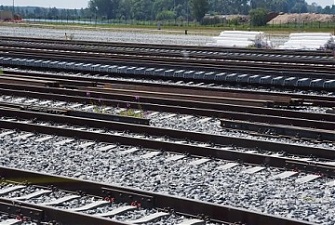Latvia, Legislation, Railways
International Internet Magazine. Baltic States news & analytics
Saturday, 27.12.2025, 10:49
Several companies complain about possible misconduct in the Procurement Procedures of the State-Owned Latvian Railway Company involving Siemens and Bombardier
 Print version
Print version |
|---|
The
state-owned Latvian Railways Company has organised three project procurement
processes over the course of a lengthy period of time, and all of them have
been unsuccessful due to complaints from different legal entities:
-
an open bid for tenders for the development and construction of the
Daugavpils reception yard and its access lines;
-
an open bid for tenders for the development and construction of the
Daugavpils sorting station;
-
an open bid for tenders for modernisation and construction of the Rīga
Railway section Sarkandaugava-Mangaļi-Ziemeļblāzma.
“This situation
with a major Latvian Railways procurement procedure related to railway
infrastructure point, as far as I am concerned, to a significant problem with
the absorption of EU funds in Latvia.
Information that has been included in complaints about the procurement
procedure suggest that there may have been dishonest attempts to limit the
competition and create privileges for international companies such as
Bombardier and Siemens in a more than 100
million euros worth public tenders,”
says Anita Laima Lancmane, Board member of IMPACT 2040.
A.Lancmane
notes that particularly upsetting is publicly available information that
suggests that the "handwriting of Siemens" might be evident when
procurement documentation was written up - this would basically be a loud
violation of competition laws.
IMPACT 2040
regularly monitors large EU procurements and the spending of EU funds, also
analysing and comparing practices related to the implementation of projects in
the EU. Hence, IMPACT 2040 has also turned to the European Parliament and
European Commission as well as internal compliance departments of Siemens and
Bombardier companies to pay attention to the possible misconduct of their
regional offices.
Complaints
have been filed with respect to both of the projects in Daugavpils. Complaints
about the shunting yard station have been submitted by SIA Fima and AS
LNK Industries, while complaints about the Reception yard have come from SIA
Skonto būve and CBF SIA Binders.
The essence of complaints related to the development and construction of the Daugavpils shunting yard station
The
complaint relates to the mandatory requirement that the offer must be adapted
to the existing Bombardier system, the argument being that this created
crippled competition, because technical and economic support was given to Bombardier
as the provider of the system in comparison to other applicants.
CBF SIA
Binders argues that
the client had a discriminatory requirement that violated Directives 2014/24/EU
and 2014/25/EU, which say that technical specifications must avoid artificial
reduction of competition by having requirements that give advantages to a
specific company. In this case, the company
argues that the technical specifications of the bid for tenders created
advantages specifically for the developer and maintainer of the Bombardier
system.
SIA
Skonto būve filed
the same complaints about the client, insisting that applicants had far greater
expenses when submitting a bid because only the Bombardier company would have
far lesser expenditures due to the fact that the system (which needs to be
interconnected) is manufactured by Bombardier itself.
The essence of complaints related to the development and construction of the Daugavpils shunting yard station
SIA Fima claimed that some requirements in
the bid for tenders were not compatible with the subject of the procurement,
thus illegally making it harder for other applicants to submit an offer. It suspects that the text for the bid for
tenders was written specifically in the interests of Siemens. The technical specifications for the bid for
tenders define requirements for a specific solutions and products(Siemens),
not functional or operational requirements, thus creating unjustified
competitive advantages for one manufacturer.
SIA Fima also argued that the specifications require that the
break shall be designed to work with wagon speeds of up to 10m/s. Such speed is
provided by Siemens retarders. SIA
Fima claimed that a lower entrance speed would be totally sufficient for
the handling of 3,500 wagons. The
company also says that the requirements in the bid for tenders apply to a
specific product from a specific company (Siemens). Its partner, První
Signální a.s. asked Siemens AG about the possibility to purchase
these retarder systems, but Siemens
AG refused. Thus, SIA Fima
believes that the choice of a supplier in this specific bid for tenders was
made not by Latvian Railways, but instead by Siemens AG, which
the client specified as the manufacturer of equipment.
Arguments
for AS LNK Industries: In addition to the idea that the client's
technical specification specifically required hydraulic, not pneumatic retarder
systems would make the project much more expensive, the company also argues
that Latvian Railways made absurd requirements about the experience of
applicants. The documents of the
procurement say that the applicant must have experience in the use of the
1520cm track width and the relevant shunting system. The complainant insists that this rail width
was used when installing railways in Latvia, Estonia, Lithuania, Finland and
former republics of the USSR, but not in many other countries. Most European countries mainly use 1435 cm
track widths. Accordingly, the
complainant argues that this requirement excludes applicants who have
experience in building railway infrastructure in European countries. It also claims to have information to
indicate that only two companies have the necessary experience -- the Latvian
branch of Siemens Mobility Oy, and the AS BMGS company.








 «The Baltic Course» Is Sold and Stays in Business!
«The Baltic Course» Is Sold and Stays in Business!

